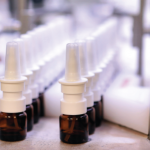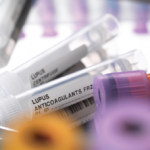One approach is to use interferon-alpha to immunize patients so they develop their own antibodies to it. This is now in early- to mid-stage development.
Another strategy has been to specifically target interferon-alpha with monoclonal antibodies, of which there are three such products: rontalizumab, which was studied in a failed trial; sifalimumab, which has generated “some excitement” despite response rates of only about 15% with the highest dose studied; and AGS009, which has been through Phase 1.
A broader effect on the type I interferon pathway occurs with anifrolumab, an antibody that binds to the receptor for all type I interferons. A response rate of 26% above placebo in SLE patients was observed in a Phase 2 trial.
Still another product, in Phase 1 development, is an antibody that reacts with BDCA2, a molecule on plasmacytoid dendritic cells that are the chief producers of interferons.
B Cells & T Cells
A large Phase 3 trial of an antibody to CD22 ended in a failure, as did trials of two antibodies to CD20, one in SLE and another in LN—although Dr. Furie said “we’re still believers in targeting B cells.”
There are now about 5 trials going on studying rituximab, an anti-CD20 antibody. Plus, Dr. Furie and others are working on an LN trial of obinutuzumab, which is a third-generation anti-CD20 antibody, and seemingly the most potent.
Another highlight has been the revival of hydrochloroquine, which had previously been administered primarily to lupus patients with arthritis or rash, but has been found to have benefits in a lot of different domains, including lowering lipid levels, preventing thrombosis, preventing flares & improving survival.
BLyS Pathway
Still another strategy is to inhibit essential growth factors for B cells through inhibition of the BLyS-APRIL pathway. Belimumab works in this way, and is now FDA approved. But this approach, too, has ended with failed trials, including Phase 3 trials of tabalumab, a Phase 2 trial of blisibimod and Phase 2 trials of atacicept, although development of blisibimod and atacicept continues, Dr. Furie said.
He said the mixed results with the BLyS inhibitors are perplexing.
“Why do certain ones work and other ones fail? I don’t know,” he said. But he added that he suspected that, in some cases, the doses being used may have been too low.
Trials studying drugs that are intended to interfere with the B cell–T cell interaction have ended without success as well.
Cytokines
These are a potential target, but two interleukin (IL) 6 blockers so far—sirukumab and a product known as PF-04236921—have failed. The IL-6 receptor blocker tocilizumab seemed to improve arthritis but was associated with neutropenia.
Better Research Needed
Changes are needed to generate better results, Dr. Furie said. He called for better pre-clinical models and observational studies and short, small early clinical trials that don’t require very many patients.



